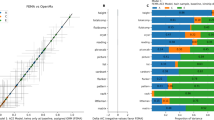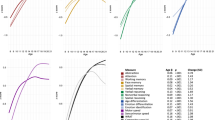Abstract
The data release of Adolescent Brain Cognitive Development® (ABCD) Study represents an extensive resource for investigating factors relating to child development and mental wellbeing. The genotype data of ABCD has been used extensively in the context of genetic analysis, including genome-wide association studies and polygenic score predictions. However, there are unique opportunities provided by ABCD genetic data that have not yet been fully tapped. The diverse genomic variability, the enriched relatedness among ABCD subsets, and the longitudinal design of the ABCD challenge researchers to perform novel analyses to gain deeper insight into human brain development. Genetic instruments derived from the ABCD genetic data, such as genetic principal components, can help to better control confounds beyond the context of genetic analyses. To facilitate the use genomic information in the ABCD for inference, we here detail the processing procedures, quality controls, general characteristics, and the corresponding resources in the ABCD genotype data of release 4.0.




Similar content being viewed by others
References
Abdellaoui A, Yengo L, Verweij KJH, Visscher PM (2023) 15 years of GWAS discovery: realizing the promise. Am J Hum Genet. https://doi.org/10.1016/j.ajhg.2022.12.011
Affymetrix Power Tools (2022). https://www.thermofisher.com/us/en/home/life-science/microarray-analysis/microarray-analysis-partners-programs/affymetrix-developers-network/affymetrix-power-tools.html
Auton A et al (2015) A global reference for human genetic variation. Nature 526:68–74. https://doi.org/10.1038/nature15393
Barch DM et al (2018) Demographic, physical and mental health assessments in the adolescent brain and cognitive development study: rationale and description. Dev Cogn Neurosci 32:55–66. https://doi.org/10.1016/j.dcn.2017.10.010
Baurley JW, Edlund CK, Pardamean CI, Conti DV, Bergen AW (2016) Smokescreen: a targeted genotyping array for addiction research. BMC Genomics 17:145. https://doi.org/10.1186/s12864-016-2495-7
Casey BJ et al (2018) The adolescent brain cognitive development (ABCD) study: imaging acquisition across 21 sites. Dev Cogn Neurosci 32:43–54. https://doi.org/10.1016/j.dcn.2018.03.001
Chen SF et al (2020) Genotype imputation and variability in polygenic risk score estimation. Genome Med 12:100. https://doi.org/10.1186/s13073-020-00801-x
Choi KW et al (2022) Integrative analysis of genomic and exposomic influences on youth mental health. J Child Psychol Psychiatr 63:1196–1205. https://doi.org/10.1111/jcpp.13664
Conomos MP, Miller MB, Thornton TA (2015) Robust inference of population structure for ancestry prediction and correction of stratification in the presence of relatedness. Genet Epidemiol 39:276–293. https://doi.org/10.1002/gepi.21896
Conomos MP, Reiner AP, Weir BS, Thornton TA (2016) Model-free estimation of recent genetic relatedness. Am J Hum Genet 98:127–148. https://doi.org/10.1016/j.ajhg.2015.11.022
Das S et al (2016) Next-generation genotype imputation service and methods. Nat Genet 48:1284–1287. https://doi.org/10.1038/ng.3656
Dick AS et al (2021) Meaningful associations in the adolescent brain cognitive development study. Neuroimage 239:118262. https://doi.org/10.1016/j.neuroimage.2021.118262
Fan CC et al (2015) Modeling the 3D geometry of the cortical surface with genetic ancestry. Curr Biol 25:1988–1992. https://doi.org/10.1016/j.cub.2015.06.006
Fan CC et al (2022) Multivariate genome-wide association study on tissue-sensitive diffusion metrics highlights pathways that shape the human brain. Nat Commun 13:2423. https://doi.org/10.1038/s41467-022-30110-3
Freedman ML et al (2004) Assessing the impact of population stratification on genetic association studies. Nat Genet 36:388–393. https://doi.org/10.1038/ng1333
Gogarten SM et al (2019) Genetic association testing using the GENESIS R/Bioconductor package. Bioinformatics 35:5346–5348. https://doi.org/10.1093/bioinformatics/btz567
Hagler DJ et al (2019) Image processing and analysis methods for the adolescent brain cognitive development study. Neuroimage 202:116091. https://doi.org/10.1016/j.neuroimage.2019.116091
Hatoum AS et al (2021) Polygenic risk scores for alcohol involvement relate to brain structure in substance-naïve children: Results from the ABCD study. Genes Brain Behav. https://doi.org/10.1111/gbb.12756
Hernandez LM et al (2023) Decoupling sleep and brain size in childhood: an investigation of genetic covariation in the adolescent brain cognitive development study. Biol Psychiatr Glob Open Sci 3:139–148. https://doi.org/10.1016/j.bpsgos.2021.12.011
Howe LJ et al (2022) Within-sibship genome-wide association analyses decrease bias in estimates of direct genetic effects. Nat Genet 54:581–592. https://doi.org/10.1038/s41588-022-01062-7
Huang TH, Loughnan R, Thompson WK, Fan CC (2022) The impact of population stratification on the analysis of multimodal neuroimaging derived measures. bioRxiv. https://doi.org/10.1101/2022.08.06.503037
Iacono WG et al (2018) The utility of twins in developmental cognitive neuroscience research: how twins strengthen the ABCD research design. Dev Cogn Neurosci 32:30–42. https://doi.org/10.1016/j.dcn.2017.09.001
Johnson EC et al (2020) A large-scale genome-wide association study meta-analysis of cannabis use disorder. Lancet Psychiatr 7:1032–1045. https://doi.org/10.1016/S2215-0366(20)30339-4
Jung B et al (2022) Rare copy number variants in males and females with childhood attention-deficit/hyperactivity disorder. Mol Psychiatry. https://doi.org/10.1038/s41380-022-01906-y
Kendall KM et al (2017) Cognitive performance among carriers of pathogenic copy number variants: analysis of 152,000 UK Biobank subjects. Biol Psychiatry 82:103–110. https://doi.org/10.1016/j.biopsych.2016.08.014
Lee PH et al (2022) Associations between genetic risk for adult suicide attempt and suicidal behaviors in young children in the US. JAMA Psychiatr 79:971–980. https://doi.org/10.1001/jamapsychiatry.2022.2379
Loughnan RJ et al (2022) Unique prediction of developmental psychopathology from genetic and familial risk. J Child Psychol Psychiatr 63:1631–1643. https://doi.org/10.1111/jcpp.13649
Loughnan RJ et al (2022) Generalization of cortical MOSTest genome-wide associations within and across samples. Neuroimage 263:119632. https://doi.org/10.1016/j.neuroimage.2022.119632
Maes HHM et al (2023) Genetic and environmental variation in continuous phenotypes in the ABCD study®. Behav Genet 53:1–24. https://doi.org/10.1007/s10519-022-10123-w
Makowski C et al (2022) Discovery of genomic loci of the human cerebral cortex using genetically informed brain atlases. Science 375:522–528. https://doi.org/10.1126/science.abe8457
Marek S et al (2022) Reproducible brain-wide association studies require thousands of individuals. Nature 603:654–660. https://doi.org/10.1038/s41586-022-04492-9
Merz EC et al (2022) Educational attainment polygenic scores, socioeconomic factors, and cortical structure in children and adolescents. Hum Brain Mapp 43:4886–4900. https://doi.org/10.1002/hbm.26034
Morys F et al (2023) Neuroanatomical correlates of genetic risk for obesity in children. Transl Psychiatr 13:1. https://doi.org/10.1038/s41398-022-02301-5
Moses M et al (2022) Working memory and reaction time variability mediate the relationship between polygenic risk and ADHD traits in a general population sample. Mol Psychiatr 27:5028–5037. https://doi.org/10.1038/s41380-022-01775-5
Naqvi S et al (2021) Shared heritability of human face and brain shape. Nat Genet 53:830–839. https://doi.org/10.1038/s41588-021-00827-w
Novembre J, Stephens M (2008) Interpreting principal component analyses of spatial population genetic variation. Nat Genet 40:646–649. https://doi.org/10.1038/ng.139
Novembre J et al (2008) Genes mirror geography within Europe. Nature 456:98–101. https://doi.org/10.1038/nature07331
Ohi K et al (2021) Polygenic risk scores for major psychiatric and neurodevelopmental disorders contribute to sleep disturbance in childhood: Adolescent Brain Cognitive Development (ABCD) Study. Transl Psychiatr 11:187. https://doi.org/10.1038/s41398-021-01308-8
Okbay A et al (2022) Polygenic prediction of educational attainment within and between families from genome-wide association analyses in 3 million individuals. Nat Genet 54:437–449. https://doi.org/10.1038/s41588-022-01016-z
Peterson RE et al (2019) Genome-wide association studies in ancestrally diverse populations: opportunities, methods, pitfalls, and recommendations. Cell 179:589–603. https://doi.org/10.1016/j.cell.2019.08.051
Price AL et al (2006) Principal components analysis corrects for stratification in genome-wide association studies. Nat Genet 38:904–909. https://doi.org/10.1038/ng1847
Ruan Y et al (2022) Improving polygenic prediction in ancestrally diverse populations. Nat Genet 54:573–580. https://doi.org/10.1038/s41588-022-01054-7
Selzam S et al (2019) Comparing within- and between-family polygenic score prediction. Am J Hum Genet 105:351–363. https://doi.org/10.1016/j.ajhg.2019.06.006
Shadrin AA et al (2021) Vertex-wise multivariate genome-wide association study identifies 780 unique genetic loci associated with cortical morphology. Neuroimage 244:118603. https://doi.org/10.1016/j.neuroimage.2021.118603
Taliun D et al (2021) Sequencing of 53,831 diverse genomes from the NHLBI TOPMed Program. Nature 590:290–299. https://doi.org/10.1038/s41586-021-03205-y
Uban KA et al (2018) Biospecimens and the ABCD study: rationale, methods of collection, measurement and early data. Dev Cogn Neurosci 32:97–106. https://doi.org/10.1016/j.dcn.2018.03.005
Uffelmann E et al (2021) Genome-wide association studies. Nat Rev Methods Primers 1:59. https://doi.org/10.1038/s43586-021-00056-9
van der Meer D et al (2020) Understanding the genetic determinants of the brain with MOSTest. Nat Commun 11:3512. https://doi.org/10.1038/s41467-020-17368-1
Wainberg M, Jacobs GR, Voineskos AN, Tripathy SJ (2022) Neurobiological, familial and genetic risk factors for dimensional psychopathology in the adolescent brain cognitive development study. Mol Psychiatr 27:2731–2741. https://doi.org/10.1038/s41380-022-01522-w
Wang K et al (2007) PennCNV: an integrated hidden Markov model designed for high-resolution copy number variation detection in whole-genome SNP genotyping data. Genome Res 17:1665–1674. https://doi.org/10.1101/gr.6861907
Wojcik GL et al (2019) Genetic analyses of diverse populations improves discovery for complex traits. Nature 570:514–518. https://doi.org/10.1038/s41586-019-1310-4
Zhao B et al (2022) Common variants contribute to intrinsic human brain functional networks. Nat Genet 54:508–517. https://doi.org/10.1038/s41588-022-01039-6
Acknowledgements
Data used in the preparation of this article were obtained from the Adolescent Brain Cognitive DevelopmentSM (ABCD) Study (https://abcdstudy.org), held in the NIMH Data Archive (NDA). The ABCD Study® is supported by the National Institutes of Health and additional federal partners under award numbers U01DA041048, U01DA050989, U01DA051016, U01DA041022, U01DA051018, U01DA051037, U01DA050987, U01DA041174, U01DA041106, U01DA041117, U01DA041028, U01DA041134, U01DA050988, U01DA051039, U01DA041156, U01DA041025, U01DA041120, U01DA051038, U01DA041148, U01DA041093, U01DA041089, U24DA041123, U24DA041147. A full list of supporters is available at https://abcdstudy.org/federal-partners.html. A listing of participating sites and a complete listing of the study investigators can be found at https://abcdstudy.org/consortium_members/. ABCD consortium investigators designed and implemented the study and/or provided data but did not necessarily participate in the analysis or writing of this report. The contributing members of the ABCD Genetic Working Group include, in alphabetic ordering:
Arpana Agrawal | Department of Psychiatry, School of Medicine, Washington University in St. Louis |
Gaya Dowling | National Institute on Drug Abuse |
Hugh Garavan | Department of Psychological Science, The University of Vermont |
Kimberly LeBlanc | National Institute on Drug Abuse |
Michael Neale | Virginia Institute for Psychiatric and Behavioral Genetics, Virginia Commonwealth University |
Naomi Friedman | Institute for Behavioral Genetics, University of Colorado Boulder |
Pamela Madden | Department of Psychiatry, School of Medicine, Washington University in St. Louis |
Roger Little | National Institute on Drug Abuse |
Sandra A. Brown | Departments of Psychology and Psychiatry, University of California, San Diego |
Terry Jernigan | Center for Human Development, University of California, San Diego |
Wesley K. Thompson | Laureate Institute for Brain Research |
Funding
CCF was supported by grant R01MH122688, RF1MH120025, and R01MH128959 funded by the National Institute for Mental Health (NIMH).
Author information
Authors and Affiliations
Consortia
Contributions
CCF and RL: wrote the main manuscript. CCF: prepared all the figures. All authors reviewed the manuscript and provided the comments for revisions.
Corresponding author
Ethics declarations
Conflict of interest
Chun Chieh Fan, Robert Loughnan, Sylia Wilson, John K. Hewitt, ABCD Genetic Working Group declared that they have no conflict of interest.
Human and Animal Rights and Informed consent
The ABCD Study has appropriate informed consent for all participants and IRB reviewed documentation procedures. This study only involves the released data in unidentifiable format and is compliant to the Data Use Agreement of ABCD Data release.
Additional information
Publisher's Note
Springer Nature remains neutral with regard to jurisdictional claims in published maps and institutional affiliations.
The members of ABCD Genetic Working Group have been listed in acknowledgements.
Rights and permissions
Springer Nature or its licensor (e.g. a society or other partner) holds exclusive rights to this article under a publishing agreement with the author(s) or other rightsholder(s); author self-archiving of the accepted manuscript version of this article is solely governed by the terms of such publishing agreement and applicable law.
About this article
Cite this article
Fan, C.C., Loughnan, R., Wilson, S. et al. Genotype Data and Derived Genetic Instruments of Adolescent Brain Cognitive Development Study® for Better Understanding of Human Brain Development. Behav Genet 53, 159–168 (2023). https://doi.org/10.1007/s10519-023-10143-0
Received:
Accepted:
Published:
Issue Date:
DOI: https://doi.org/10.1007/s10519-023-10143-0




